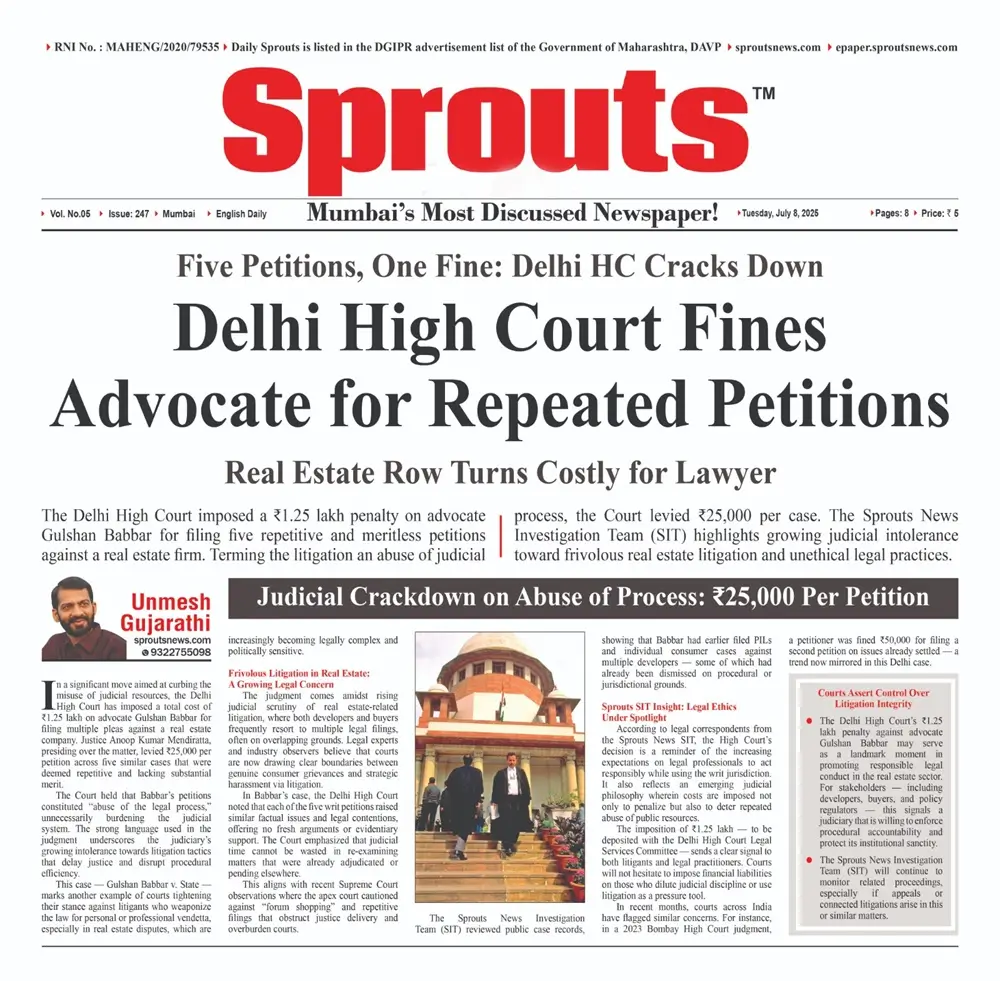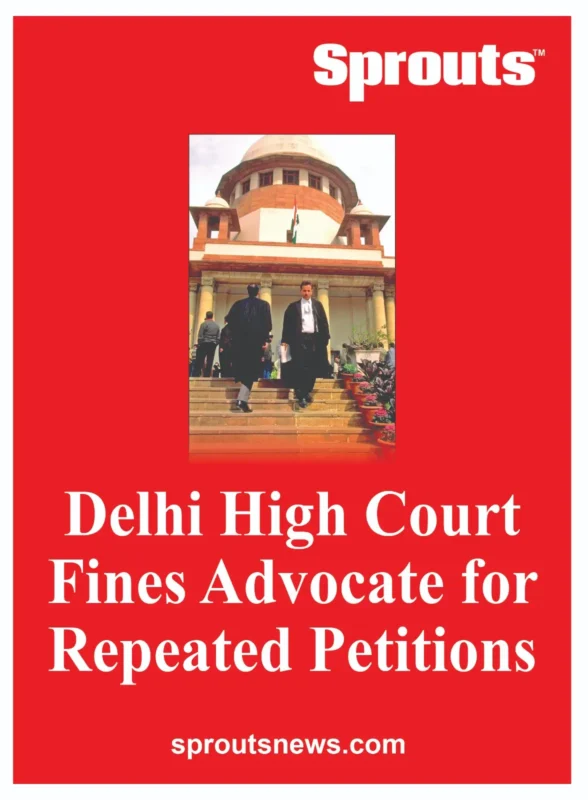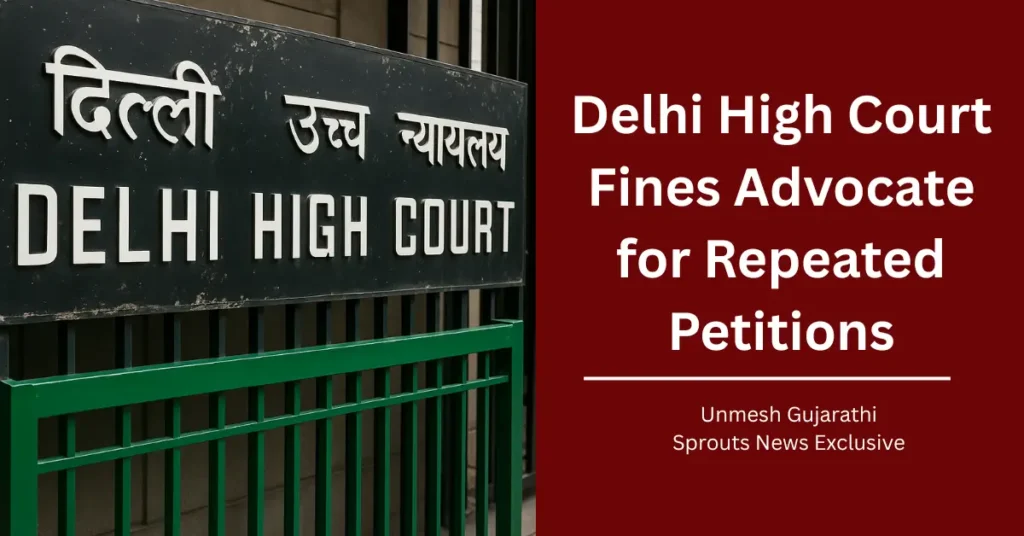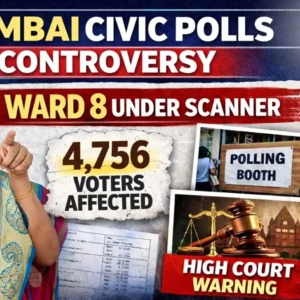Delhi High Court Fines Advocate for Repeated Petitions
•Five Petitions, One Fine: Delhi HC Cracks Down
• Real Estate Row Turns Costly for Lawyer
Unmesh Gujarathi
Sprouts News Exclusive
Contact: +91 9322755098
The Delhi High Court imposed a ₹1.25 lakh penalty on advocate Gulshan Babbar for filing five repetitive and meritless petitions against a real estate firm. Terming the litigation an abuse of judicial process, the Court levied ₹25,000 per case. The Sprouts News Investigation Team (SIT) highlights growing judicial intolerance toward frivolous real estate litigation and unethical legal practices.
Judicial Crackdown on Abuse of Process: ₹25,000 Per Petition
In a significant move aimed at curbing the misuse of judicial resources, the Delhi High Court has imposed a total cost of ₹1.25 lakh on advocate Gulshan Babbar for filing multiple pleas against a real estate company. Justice Anoop Kumar Mendiratta, presiding over the matter, levied ₹25,000 per petition across five similar cases that were deemed repetitive and lacking substantial merit.
The Court held that Babbar’s petitions constituted “abuse of the legal process,” unnecessarily burdening the judicial system. The strong language used in the judgment underscores the judiciary’s growing intolerance towards litigation tactics that delay justice and disrupt procedural efficiency.
This case — Gulshan Babbar v. State — marks another example of courts tightening their stance against litigants who weaponize the law for personal or professional vendetta, especially in real estate disputes, which are increasingly becoming legally complex and politically sensitive.

Click Here To Download the News Attachment
Frivolous Litigation in Real Estate: A Growing Legal Concern
The judgment comes amidst rising judicial scrutiny of real estate-related litigation, where both developers and buyers frequently resort to multiple legal filings, often on overlapping grounds. Legal experts and industry observers believe that courts are now drawing clear boundaries between genuine consumer grievances and strategic harassment via litigation.
In Babbar’s case, the Delhi High Court noted that each of the five writ petitions raised similar factual issues and legal contentions, offering no fresh arguments or evidentiary support. The Court emphasized that judicial time cannot be wasted in re-examining matters that were already adjudicated or pending elsewhere.
This aligns with recent Supreme Court observations where the apex court cautioned against “forum shopping” and repetitive filings that obstruct justice delivery and overburden courts.
The Sprouts News Investigation Team (SIT) reviewed public case records, showing that Babbar had earlier filed PILs and individual consumer cases against multiple developers — some of which had already been dismissed on procedural or jurisdictional grounds.
Sprouts SIT Insight: Legal Ethics Under Spotlight
According to legal correspondents from the Sprouts News SIT, the High Court’s decision is a reminder of the increasing expectations on legal professionals to act responsibly while using the writ jurisdiction. It also reflects an emerging judicial philosophy wherein costs are imposed not only to penalize but also to deter repeated abuse of public resources.
The imposition of ₹1.25 lakh — to be deposited with the Delhi High Court Legal Services Committee — sends a clear signal to both litigants and legal practitioners. Courts will not hesitate to impose financial liabilities on those who dilute judicial discipline or use litigation as a pressure tool.
In recent months, courts across India have flagged similar concerns. For instance, in a 2023 Bombay High Court judgment, a petitioner was fined ₹50,000 for filing a second petition on issues already settled — a trend now mirrored in this Delhi case.

Also Read: India‑Pakistan Trade Continues Despite ‘Operation Sindoor’ Fallout News.
Courts Assert Control Over Litigation Integrity
The Delhi High Court’s ₹1.25 lakh penalty against advocate Gulshan Babbar may serve as a landmark moment in promoting responsible legal conduct in the real estate sector. For stakeholders — including developers, buyers, and policy regulators — this signals a judiciary that is willing to enforce procedural accountability and protect its institutional sanctity.
The Sprouts News Investigation Team (SIT) will continue to monitor related proceedings, especially if appeals or connected litigations arise in this or similar matters.
















